Recounting Blessings - My Father’s Tale
As
my grandfather John Henderson was growing up in the 1880s and 1890s
with one brother and two sisters in Newbigging, Newtyle, Forfarshire,
so my future grandmother Janet (Jessie) Kerr was being reared with
eight other siblings until the turn of the century in the Coachman’s
Lodge on the Cunningham Estate of Old Polmaise, Fallin in the
Bannockburn Parish of Stirling.
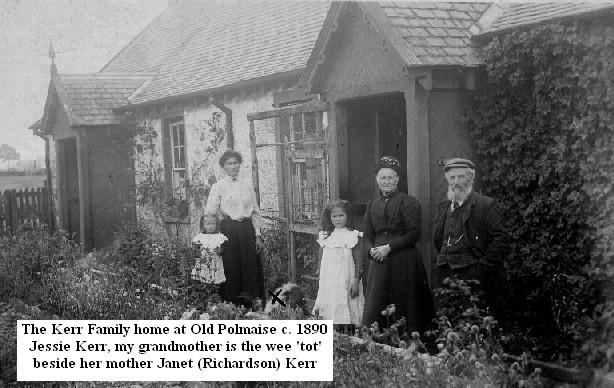
It is
probable that after the death of his mother Jessie Alexander Nicoll
Henderson in 1903 in Newbigging, and perhaps even before this, my
grandfather John Henderson, born in 1885 on the Couston Estate,
Newtyle, was, like his older brother James (Jim) Nicoll Henderson,
working on the railways of Perthshire and Forfarshire. Certainly,
according to the 1901 National Census, Jim Nicoll Henderson was living
in Kinbuck and working on the railway there in that year. His brother,
my grandfather John, I seem to recall hearing, started at Alyth
Junction, and this probably commenced around 1898/99. From the data on
a Certificate that I hold in my archives, 1898 was the year in which
John gained a Scotch Education Department Merit award at Lochee Liff
Road Public School in the burgh of Dundee.
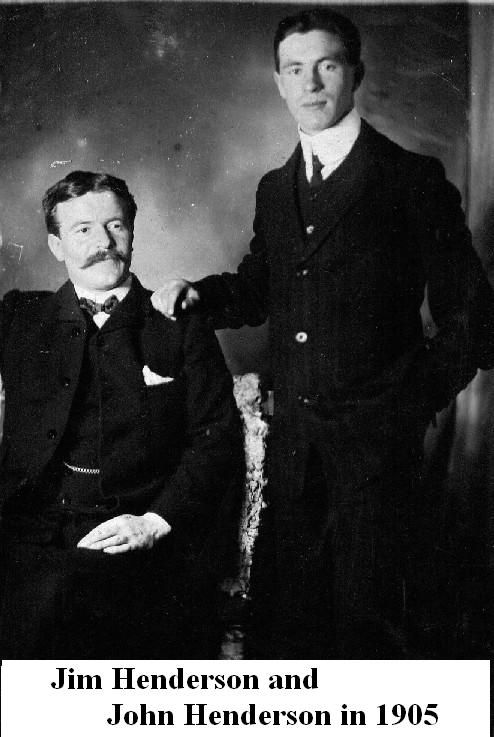
However
the first clear awareness that I have of my grandfather John Henderson
as a working man comes from an inherited audio-tape that holds
reminiscences that my dad, James Nicoll Kerr (JNK) Henderson recorded
in 1982 at his home in 5 Victoria Park, Kilsyth. According to JNK,
his father John had been employed as a clerk at Dunblane Railway
Station, Perthshire in 1907, and that he had married Jessie in the
Kerr town family home at 18 Bruce Street, Stirling in the December of
that year.
JNK
tells his story :
"With
advancing years, and lowering horizons, it's a great comfort, and
ever-increasing source of wonder, to look back and count ones
blessings over these seventy odd years. I myself am no Cockney born
within hearing of London's Bow Bells, although the cathedral chimes
still toll beautifully in the Scottish city Dunblane where I was born.
Close by my birthplace, the river flowed over lovely waterfalls, in
sight and sound of which express trains thundered down the main line
to the South, chugged their way up to the tunnel leading to the North,
to say nothing of the local trains that lumbered past while others
were shunted amidst much clattering and rattling in the goods yard or
sidings.
1908 is
seventy four years ago and my father was a railwayman in these days
when the railway companies were four in number, all privately owned of
course - The Caledonian Company, The North British Company, The
Highland Company and The GWRE. My father was employed by The
Caledonian Company and in these days trade unions were in their
infancy and wages were anything but generous. A railway clerk dealt
with all kinds of traffic - passenger, freight, goods and parcels. He
worked a ten hour day, six days a week and had one week's holiday
leave, without pay, each year. Practically everything in these days
was conveyed by rail because there were so few lorries, no buses and
overall, traffic on the roads was very light.
Four
years later in 1912, having passed most of our time since 1908 living
in Doune, we moved to Stirling, taking up our residence at 4 William
Place in the Burghmuir area of the town. My early characteristics, as
commented on by my parents when we were living in Doune, didn't show
any great promise of true greatness in the future - unlike so many
opinions I heard about the countless mothers' darlings I dealt with in
my professional teaching life! According to my mother, I had lovely
hair and with hair like that I might have made a bonny girl.
Considering that I am a twin, and my twin, who died in infancy, was a
girl, perhaps there could have been some confusion! I am also told
that, as a three year old in Doune, I was sent across the Square to
the grocer's to buy a tin of Brasso, only to return in tears without
it. When asked why I hadn't brought it, I am quoted as having said,
'But Mum, I can't say Brasso!'
My
first school was the Craigs Primary School in George Street, Stirling
and my first teacher's name was a Miss Nisbet - all spinsters in these
days - while the Headmaster was a Mr Yule whose son had a chemist's
shop in the town for many years.
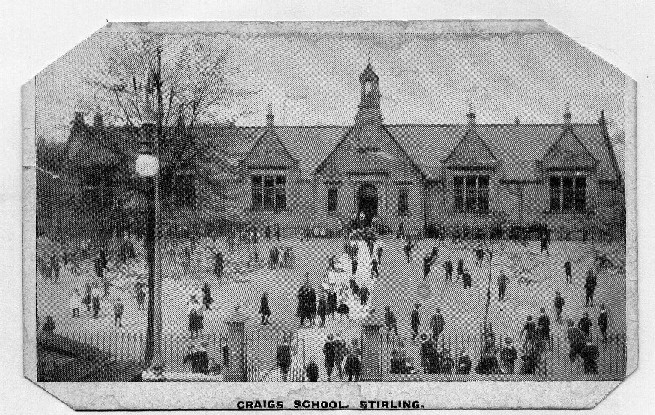
I went
to 'The Craigs' in the August of nineteen hundred and thirteen, just
one year before the First World War began, and three things stand out
in my mind concerning these times. First, I was smacked on my first
day at school for standing on a desk! Second, I was forbidden to
write with my left hand, the one I had always used naturally for that
purpose, and I was obliged to use my right hand instead! Third, there
was a medal in the class which the best scholar for the week wore
round his or her neck until it was won by someone else. My mother
declared that every time she renewed the ribbon with a lovely new one,
I always lost the medal. My chief rival for the honour week by week
was a Willie Brisbane, who lived in the same street, and whose two
clever sons became pupils of mine when I arrived in Cambusbarron much
later in my life as headmaster of the local primary school there in
1949.
This
particular sojourn in Stirling was short lived at this point as my
father soon received promotion to be railway stationmaster at
Longforgan in the Carse of Gowrie only five miles from Dundee. I spent
an ideal childhood in Longforgan, growing up in a truly rural
environment, learning so much of the lore of nature amongst the
fields, the trees, the flowers, the burn running into the silvery Tay
a quarter of a mile away, the birds, the poultry, animals of all
kinds, to say nothing of the elements in their seasons.
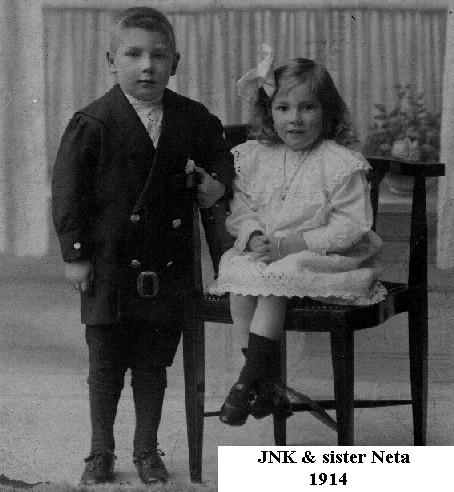
The
Great War must have been never very far from the front of my parents'
minds in these perilous years, but I was initially too young to be
conscious of the great tragedy of war. I can recall however some of
the rather exciting sides of things - for instance, my first sight of
a German Zeppelin trying to cripple the use of the Forth and Tay
Bridges as my father and I stood and watched from the station platform
railway bridge about midnight one night, listening for it and looking
towards Dundee in the distance, blacked out completely and looking
like a 'dead' town. The 'Alerts' could last for many hours, and trains
of any kind had to be stopped in their tracks and completely blacked
out until the 'All Clear' was again declared. I vividly remember my
mother making tea for dozens of passengers from a London to Dundee
train stopped in our station at four o'clock in the morning.
However
as my own years advanced, I did become aware of adult stress and
anguish and of the bereavement that prevailed over these four years.
But I can remember too that on the 11th of November 1918 every ship on
the Tay that had a hooter seemed to blow it throughout the whole day.
I can remember too that my mother was ill, very ill, with that 'flu
from which hundreds died in Scotland in that epidemic. I also remember
how people flocked to church services to express their relief and
thanksgiving. I can recall Rationing and Ration Books and the types of
food that were affected, including the so-called white bread! I can
also vaguely remember talk at school of 'U Boats'- and also of boys,
as well girls, knitting woollen scarves and sending them to the
trenches, enclosing cakes of soap and senders' names and addresses.
The feelings of sacrifice and doing without was heightened by the male
population being taken away from our village, as from so many others,
to what was called at that time 'Doing their bit'. I can remember our
Headmaster at Longforgan Primary School, Mr A.H. Finlay, being taken
away to serve - also clerks, porters, signalmen, postmen and others
were all called away.
Right
on the station platform were all the station offices - the General
Waiting Room, the First Class Waiting Room complete with running
water, wash-hand basins and toilet, the Gentleman's and further still
along the platform, the Goods Shed. There was also the familiar bridge
over the railway to take you to the platform on the southern side.
Behind all the platform buildings there was a grand courtyard where
the coaches, bikes etc. spilled their passengers or owners before they
approached the platform. Beyond all this was the goods siding with the
high loading bank and the complicated points system for changing the
wagons from one place to another. The Station House itself was a nobly
constructed seven room stone building, but with alas no cold water, no
hot water, no WC or bathroom, no gas or electricity but a big coal
range in the kitchen and paraffin lamps everywhere. All our washing
water was provided by an enormous rain barrel at the back door
supplied by a rone pipe from the roof of the house. Our other source
of supply of water for cooking and drinking came from a spring which
ran into the burn across the road, sometimes filling up very slowly
into the white enamel pail that we kept there for that purpose. The
burn was called the Pow and flowed into the Tay further down the
plain. For toilet facilities we would use the station Waiting Room -
First Class of course. When we had guests or relatives staying with
us for holidays the daily Timetable for trains stopping at the station
was always on display on the main corridor wall of our house. Indeed
many a time I had to 'run the cutter' to make sure the way was all
clear!
The
village was one and a half miles away from the station, up-hill and
all those who worked or wanted to shop in Dundee had to use the
frequent trains that ran from Perth to Dundee. I of course knew all
the drivers, the firemen and guards on the line and usually travelled
in the Guard's Van on my regular excursions for the day by day
messages to be purchased in Dundee - the Baker's, the Butcher's and
the Fishmongers, who also bought the fresh eggs that my mother
supplied each week - and Coopers the Grocer's - I can still see in my
mind's eye the delicious tins of Westfield Syrup that adorned Coopers
window display.
Along
with quite a variety of children from about our neighbourhood, my
sister Neta and I walked that mile and a half to school each day -
rain or shine or snow or frost or whatever, with our 'Coates of
Paisley' schoolbags of paper mache - presented by that firm to all
Scottish school children in those days - mine on my back and Neta's in
her hand, these bags contained all the books we needed, a big 'piece'
and a penny for a ticket for a bowl of soup at the school 'Soupy'. Of
course my piece was never big enough, but we survived. Somehow we
were content with simple things in these days and looking back we
seemed to have great times together despite the fact that we had no
school meals or any school buses.
Every
season brought its own diversions, games and pursuits - nowadays so
many of these things seem to be connected with money and expensive
toys - wireless far less radio or television were never parts of our
lives, giving us all the greater opportunity to do our own thing. As
boys we of course played 'bools' and the girls played at 'skippin',
while 'chessies' in season always had to provide a daily champion. We
boys played football too, but most often the ball was a tin can. What
a thrill it was to be taken to Dundee to La Scala Picture House once
in a while to see a film - silent of course -and the likes of Charlie
Chaplin. I remember buying my first War Certificate from a real army
tank which was on display in Dundee. We attended Sunday School in the
village presided over by the village postmaster. The Band of Hope
meeting on a Friday night used to be one of the highlights of the
week. To give you an idea of what was thought to be a modern invention
- to us, battery torches became all the rage then and a great
favourite in your stocking hung up for Santa Claus to fill. School
concerts were always a feature of the end of the school session. I,
myself remember reciting at eleven year old, 'He's no born yet', all
five verses of it! Then the Sunday School picnic was always a Saturday
afternoon in June, when we travelled in hay-carts to a suitable meadow
in another village some miles away, the carts decorated in bunting and
the children waving flags.
Being
war-time of course we had other things to think about and do as well.
This was a good excuse to employ children to gather in the potato
harvest. The custom was to close the rural schools for the whole month
of October. I joined my school pals to work daily in the fields from
seven in the morning until five o'clock at night for the handsome sum
of one shilling and sixpence per day. We had an hour off at lunch
which was invariably 'pieces and cheese'. It was back-breaking work
and at the end of a month's toil I was taken to Dundee to visit
Birrell's shoe-shop in the Overgate where I was able to buy a pair of
boots with my earnings. There were many sore bones and muscles at the
'tatties', but never a dull moment. We got to know the ploughmen and
the horses' names, sometimes getting to help to yoke them to the cart
that went up and down the drills after the digger to empty the creels
that we had filled with potatoes. We also used to get to help at the
mill - I can still feel the chaff tick, tick, tickling me down the
back of my neck - the harvest fields, the hay making, milking the cows
in the byre and slicing the turnips for the cattle; of course we also
liked chasing the rabbits disturbed by the binder as well as enjoying
many of the hundred and one other things that could be experienced
about a farm. Then of course there was no milk left on our doorstep
each morning. Instead we had to go to the farm and collect it in the
milk-can kept for that purpose and the milk often still warm from the
byre.
From
the village school at twelve year old I went on to the Harris Academy
in Dundee where for two years I learned to live and study and enjoy a
completely different environment - that of a large city and a large
school. Moreover I travelled the five miles there and back by train
every day - another new experience in its regularity. On the sporting
front, I not only showed promise as a footballer winning my way into
the Under 14 representative team for the whole of Dundee, but also
taught myself to swim in the lovely saltwater indoor pool down at the
docks. On the academic front I managed to do some studying in between
all my other recreations - enough indeed to pick up the second year
English, History and Geography prizes at the Academy! Then, at the end
of my second year at the Harris, Neta and I went on to Forfar Academy
due to our father being promoted to the post of Stationmaster at
Justinhaugh, a station between Forfar and Brechin. We thus travelled,
together this time, daily by train to the Academy for the next two
years.

There I
enjoyed school, but my lasting memories of that period in my life are
of joining the Tannadice Troop of Boy Scouts led by a young laird,
'Jock' Neish, who seemed to think of scouting, and practising scouting
as the guiding principle of his life. He, more than any other
person, shaped and influenced my teenage years, and I pay tribute to
him as a great Scout. He was very much in the mould of the late Sir
Ian Bolton (Bart.) and the late Major F. Crum, both of whom I was
proud to be associated with when my father brought the family back to
Stirling in 1923 and, in due course, a new home at 11 Abbotsford
Place, Riverside, and another new school, the High School of Stirling.
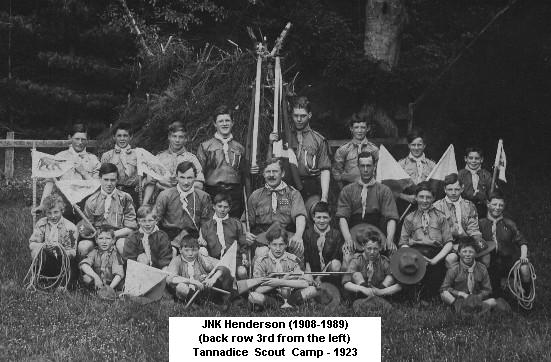
By that
time the Ten Scout Laws were woven into my system as a way of life and
it was only the cry, 'Come over into Macedonia and help us', from the
Holy Rude Church in Stirling, of which my father was an Elder, and I
had become a Sunday School teacher, that wooed me off to become the
Captain of a Boys' Brigade Company, thirty strong, in that Church.
The three Scoutmasters that I have mentioned, and the many other
magnetic personalities that I have met over the years, have
contributed greatly to the quality and enjoyment of a full life for
me. The kind of training I received has taught me, I hope, the true
meaning of sportsmanship, the ability to lose with grace and much more
besides. Then again, thanks mostly to the influence of my parents, I
have always chosen my friends carefully, but, besides these, I also
have also had plenty of acquaintances.
The
Loving Parents of JNK (b. 1908), Neta (b.1910), and Margot (b.1921)
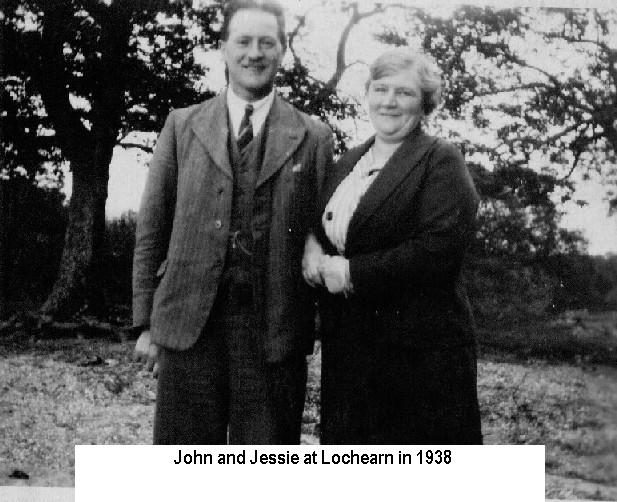
As a
teenager I was never deprived of the necessities of life but, on the
other hand, I was always encouraged to provide any extras by my own
efforts. For example, as a student during the long summer holidays, I
used to work an eight hour day as a Porter at Stirling Railway Station
for two pounds and six shillings per week.
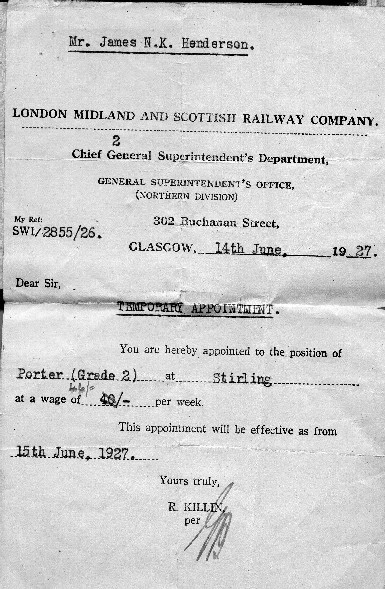
At
other times, I picked berries at Blairgowrie, and, in the wintertime I
would tutor in the evenings for three shillings an hour, and of
course, such earnings certainly helped to augment our small family
income.
JNK
with the ‘hat’!
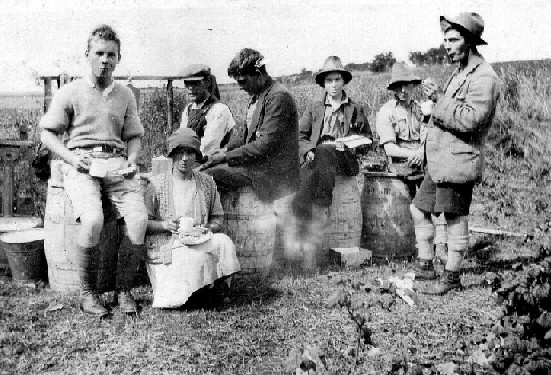
As you
can gather from these brief reminiscences from my early life, it is no
surprise really that I now look back in wonder at one long line of
helping hands, happy friendships and loyal comradeship, not
forgetting the many other supportive people along the way who guided
my development. Looking back it is clear to me now just how much more
I owed them than they owed me."
Recorded by JNK Henderson in 1982
I
continue the story:
As JNK
said in 1982, (at the end of this talk given to the PROBUS Club in
Kilsyth that year, spoken in his presence at the Club, but via a
tape-recorder due to his increasing physical infirmity and loss of
fluency in spontaneous speech) "I have said nothing of my professional
life this morning; after all I have covered only the first twenty odd
years of my life and, in the words of the Queen of Sheeba, I can say,
' the half has not been told' " !
As my
own developing memory really only started to hold impressions of our
family life from about 1943 onwards, and, as many memories one retains
of people and events tend to be very selective in nature, I cannot
possibly do full justice here to the other sixty-one years of the life
of JNK. But what I can do, is, to provide some snippets, that this
very modest father of mine perhaps only mentioned about the 1923 to
1941 period. All the foregoing was mostly learned about from listening
to his sister, my much loved Aunt Neta, my mother Nancy, and from
studying old photographs.
1923
- 1929
...... When the family returned to Stirling in 1923, JNK went to the
High School of Stirling, took his Highers in Class Five in 1925 and
then went straight on to the University of Glasgow to complete an MA
in English and Scottish History in 1928.
His
final degree exams at the University were onerous, not only
academically, but also for the mode of transport that he had to use to
get to Glasgow and the examination hall by 9.a.m. for his ‘Finals’ in
1928. The Strike that year meant that his 'Privileged Ticket' on the
non-running trains was useless and the buses were not running either.
So he had had to set off each day from 11 Abbotsford Place in the
Riverside, Stirling in the early hours of the morning on his bike,
call in at his Uncle Bob Kerr’s in Denny for a cup of tea, go on to
sit his two, three hour, papers in Glasgow, and thereafter pedal his
way wearily home to Stirling evening - always of course including
another welcome visit for cuppa in Denny on the way past!
The
following year he successfully completed teacher training in Primary
and Secondary school subjects at Jordanhill Training College, Glasgow,
and then was very fortunate to be given an immediate appointment as an
assistant teacher in Bridge of Allan Primary School.
Throughout these years, and for a few more thereafter, JNK (Jim or
Jimmy) Henderson excelled in local sport - as a Scottish Secondary
Juvenile Cup medallist with Vale of Bannock 'A' at left half-back, as
a left-handed batsman with Bridge of Allan Cricket Club, and as a
dashing wing three-quarter with Bridge of Allan Rugby Football Club.
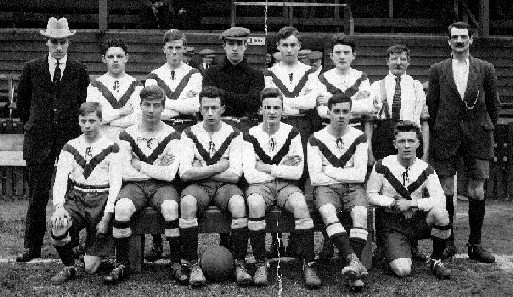
JNK won
the hand of a colleague teacher at the High School of Stirling, Nancy
Telfer of Falkirk, and they married in Falkirk on the 15th August,
1934. I learned in later years that Jim and Nancy set up home in
1934/35 in a newly-built £300 ‘Headridge’ bungalow at 17 Easter
Cornton Road, Causewayhead. The bungalow was named 'Revoan' after a
particularly memorable week in JNK's life in 1932 while trekking in
the Cairngorms with his best man-to-be, Jim ‘JJ’ Walker.
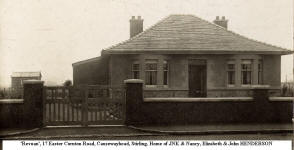
Among
other things, this was the 'love-nest' for the arrival of Elizabeth
and myself!
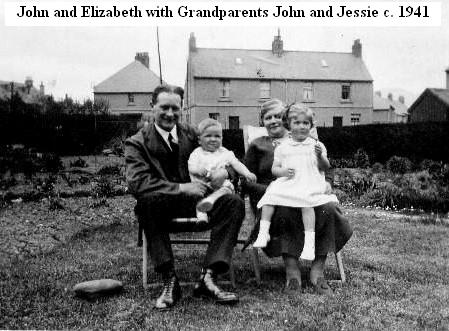
The
heavy clay garden was a challenge to JNK's horticultural skills –
those no doubt inherited from his forebears in Newtyle and Leslie. The
'black-out' roads, down hill by unlit bicycle from top of the town
fire-watching to Causewayhead in the early days of the Second World
War were negotiated regularly without any major accidents - just!

